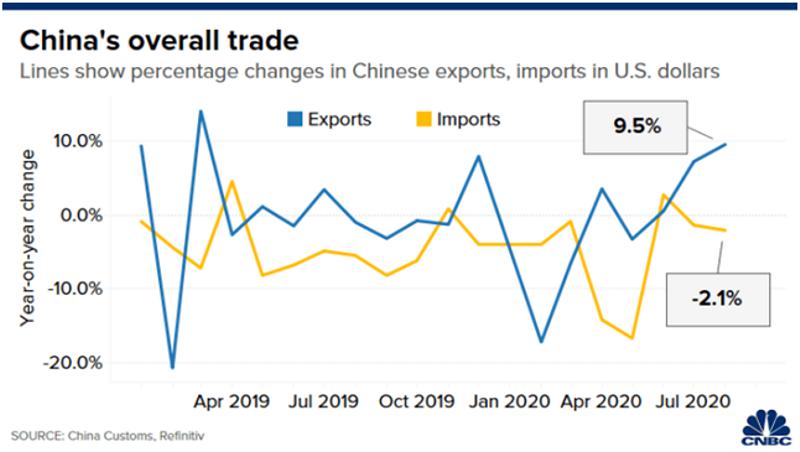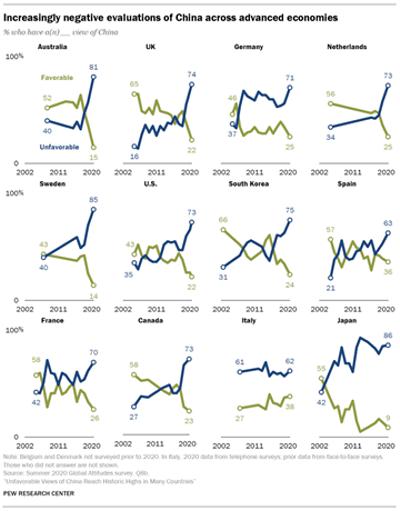China, which at the onset of the pandemic in February looked like it was on the verge of an abyss, bounced back. It seems to be faring quite well although it’s still too early to speak of a renaissance.[1]
The Chinese trade surplus, the main bone of contention with the U.S. and the thing that triggered like a landslide this new Cold War, is higher than ever. In August 2020, it amounted to approximately 58.9 billion U.S. dollars,[2] beating the $50.5 billion economists expected. China’s trade surplus was $62.33 billion in July and it may well rocket over $500 billion by year’s end.
The growth in exports was at the fastest pace in one-and-a-half years, according to Reuters records.[3]
Moreover, the epidemic is gone from China, and the country is safe from the disease that started there possibly sometime late last year. More security means also more control. In fact, here is virtually total control of personal life. The state knows everything about you: whom you meet, for how long, doing what. There is no privacy. Going in and out of buildings, bars, cinemas, trains, and buses, one has to show an ID on the phone. Plus, there is a complete network for facial recognition. Anything can be used to track you, and virtually save you from possible contagion. It won’t necessarily be used for ulterior motives, but it can be. Beijing has reestablished a social contract, similar to the ones existing also in neighboring countries, where the state provides health security in exchange for personal privacy. Personal freedom can be guaranteed as long as there is no political “interference” by the individual.
This provides an effective social platform for economic recovery ahead of everybody else.
Because basically, despite the very early warning, the U.S. didn’t manage and isn’t managing Covid yet. Epidemics are social diseases[4] and China coped with its recovery in a way that may sound objectionable to some Western countries. But looking at things from China, the U.S. didn’t have a recovery and it’s not clear when or how a recovery from Covid will occur in America and the West. Moreover, logically, the American position didn’t cut much ice in China.
The U.S. blamed China for Covid, claiming it was a terrible disease in China, but in the West many politicians underestimated its gravity and took little or no care for its prevention. Therefore, it raises the questions, is Covid bad or not? Was China right when it didn’t take preventive measures or when it took them? From Beijing it’s not clear.
This is possibly becoming the real Sputnik moment for America and the world, independent from who will be the next U.S. president. Practically and strategically, China is sophisticated and reacts more promptly than the cumbersome Soviet bureaucracy. At the beginning, some non Chinese assumed Covid could be China’s Chernobyl moment (when the 1986 fallout from the Chernobyl nuclear plant cut off the USSR at its knees), it is now conversely showing to China how Western countries are slow and inefficient.
China lonely success
China did it all alone just because it was isolated, without a network of allies or associates. So its victory is also the seed of a big problem. How can you win a confrontation with the U.S. and its allies when China is virtually quarantined? To get to Beijing, one needs de facto over half a month, between indirect travel and quarantine, plus other requirements. Moreover, as the graph below shows opinion in western countries is rapidly turning against China, and Beijing seems unable to address the issue, and perhaps it is even oblivious of its indirect massive danger.[5]
Practically, few can visit and few can go out. China is building a wall around itself, putting out only its manufactured goods that move all over the world. This isn’t sustainable over the long term, and it might have drawbacks as soon as the risk of Covid fades worldwide. This is particularly sensitive because the Chinese domestic situation is still unstable.
After 2007 China didn’t provide a safety net that could have boosted consumption, increased taxes, and made the whole system healthier. China thus skirted the political cost of moving towards democracy.[6] It conversely boosted infrastructure and real estate, and financed it through a wide array of local debt that would not show up in the national books and didn’t raise the risk of asking for more taxes and thus conceding more democracy as a way for taxpayers to control how taxes were spent. But the mountain of debt was extremely fragile and slowly started a movement to export capital, putting it in safe havens, away from the anti-corruption campaign and the risks of domestic financial earthquakes. Starting in 2015 Beijing came to limit export of capital and closed its internal market. It felt there was growing pressure of capital flight as internal debts were climbing and the anti-corruption campaign was not relenting.
In the meantime, trade in 2019 made up 35.68% of China’s GDP[7] a huge drop from 2006 when made up over 64% of GDP but still a long way from around 20%, the percentage for a large economy like the U.S. At the same time, internal consumption increased and in 2018 China was the fastest-growing consumer market in the world at 39% of the GDP but a very long way away from America and the EU, where this sector makes up 68% and 54% of the GDP. That is, in the past decade China has been restructuring its economy but not as fast as it could have with a comprehensive welfare system that would free Chinese savings (about 50% of income) for consumption.
This was avoided possibly because it was too difficult to set up a welfare system and also too costly, imposing a new tax regime that would entail massive political reforms. The government, also thanks to the 2008 financial crisis, decided to take a shortcut and prime the economy with infrastructure building. This worked but up to a point. China is still dependent on foreign markets, when Western countries have grown to dislike China, as we saw.
Mired in Debt and too much concentration of power
The result now is that China is a closed economy with a total debt of over three times its GDP, and banks demanding interest rates well above the international market, basically to bolster artificial profits of gargantuan and inefficient State-Owned Enterprises. China now has lots of infrastructure, lots of empty houses, no welfare system, and limited personal consumption to fuel the internal market. It depends heavily on exports and if its trade surplus goes down, the whole financial system could be in danger, as there are insufficient external funds to fuel its internal debts.
Moreover, thanks to the extensive and comprehensive information system, China’s President Xi Jinping potentially knows everything about the internal situation. But potentially knowing everything about 1.4 billion people is practically knowing nothing. He may be virtually isolated, and he has to rely on a small team of trusted people who may be wrong or lie to him to avoid telling him unpleasant truths in order to protect their own careers. We absolutely don’t know, but he might be practically quite isolated inside China, and he is growing more isolated from the outside world, because of the separation of Covid. He also will need to prepare to open China’s economy abroad without bursting the huge debt bubble.
In all of this, there is the fast mounting military tensions along its borders, where the possibility of an incident starting a violent clash has been budding for some months. China may feel that in a small incident, it has to avoid a defeat at all costs, to prevent the backlash of a bitter political crisis blamed on the defeated forces. It may rather go for an all-out war.
The other side at the same time might not balk at the prospect, thinking that a war with China might be better now than in a few years, when China could be stronger. The aim now could be to cut short Chinese ambitions and go for a drastic territorial reduction of the country.
Short of a full-fledged nuclear war, there is the possibility of a long, icy stalemate, where a limited war, possibly even if it is won by China, could start a massive blockade of China’s precious trade surplus. That is, like the Covid victory didn’t increase peace around China but enhanced its isolation, so a limited war around China would multiply its problems.
There are no direct and easy solutions for the many Chinese conundrums then people need to think outside of the box. In fact, the basic problem is that China is worse off now than nine months ago just because it won its Covid crisis without addressing its root problem – its political isolation with the most of the world led by the U.S.
Now there is an occasion unprecedented since World War II, almost 80 years ago. The new funds to power developed economies out of the Covid-caused crisis will be of a size unseen in the world since the Marshall Plan. Like then, there is also the political will to rebuild and reshape the world order. This is unlike at the end of the first Cold War, when the West, the winning side, thought it could simply extend its rules to the ex-communist countries. So, there are trillions of dollars, and a basic broad agreement between the U.S., EU, Japan, India, and other like-minded countries about China. That is, China is becoming the single element that brings most of the world together, to rebuild a different world where China doesn’t belong and to which it doesn’t want to belong.
[1] SettimanaNews.
[2] Statista.
[3] CNBC.
[4] The New England Journal of Medicine. Thanks to Alfredo Costa for pointing this out to me.
[5] Pew Research.
[6] See my China, In the Name of Law, and the chapter China’s inevitables death, taxes—and democracy
[7] World Bank.








This is the worst article I’ve ever read. The amount of false information and claims without evidence to back them up is absurd. I was surprised to even come across this article for my research paper, and clearly the amount of bias and false claims made this article unusable.
Let’s put things in perspective. China with a population of 1.4b is more than US, the EU, Japan together. It can survive by itself. The present international arena it faces today is no worse than 70 years ago when the US led coalition invaded Korea and threatened its border. If it could survive a war with 16 nations, it will survive again. We feel the job of the author is so appalling to convince audience that China is threatening the world in the morning and it will collapse soon in the afternoon.
Another thing worth noting is that despite China has a bad relationship with the Anglo Sphere, it has good relationship with Africa and Russia, decent relationship with South America and South East Asia. Meanwhile, I see a reluctance for the EU to join the so-called “blockade”. It’s not really a China vs the World, it’s more like China+Russa+Africa vs US+UK+Canada+Australia.
If the authorities would know everything about me, where I go, what I do, that would be trouble. In other words, the system to track your movements is far from efficient. Right now in Beijing, I never scan codes to go somewhere, so they have no trace. I have my own way. Even during the peak of limitations, nobody would know where I went, which buildings I entered. So, it is less “total control” than what people think. Overall the epidemic is under control, see what draconian measures are taken like right now in Qingdao. That obviously is only possible in China. The West has totally failed to act as it should to control the virus. Pathetic. Now the buzzword for the economy is “dual circulation”. meaning among other to boost domestic consumption. But that’s a long story…
China did not create the ugly lies coming from the mouth of Trump and his ilk. The isolation of China springs from its relative success in my opinion, and is un-warranted. Xi is the most vocal of all he world’s politicians with respect to climate change and what we must do about it, and he speaks from knowledge. Climate change and the loss of all of nature is staring us in the face and we worry about economies! We should rather follow the Chinese example and combine our energies to turn the situation around. What we must do, is switch to better energies, globally, no matter the cost. Instead, what we hear in Canada, in Germany, in all the West, is a baby’s complaint about the distress of having to wear a mask on its face.
Exactly. China is definitely not alone on trying to fix the environment, and this article clearly over exaggerate the isolation of China.